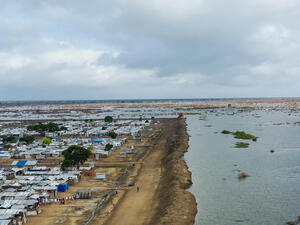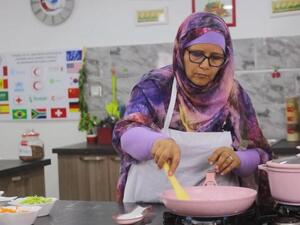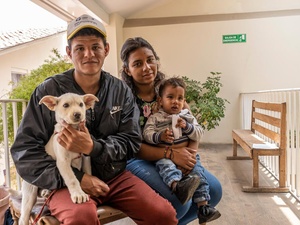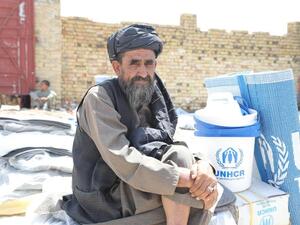Ethiopia: urgent appeal for refugee food aid
Ethiopia: urgent appeal for refugee food aid
Together with the UN World Food Programme and Ethiopia's Administration for Refugees and Returnees Affairs, we are making an urgent appeal to donors to help meet the immediate food aid needs of some 126,000 refugees in Ethiopia who rely upon rations provided through WFP to meet virtually all their dietary needs.
Due to a shortfall in contributions, rations for the mainly Sudanese and Somali refugees in Ethiopia are being cut dramatically over the next two months. Unless donors act immediately to meet the food requirements, from May onwards there will be nothing to feed the refugees.
In an address yesterday to WFP's Executive Board in Rome, High Commissioner Ruud Lubbers noted that our two agencies face many shared challenges and the most critical of these is ensuring the regular and uninterrupted supply of food to our beneficiaries. This unfolding situation in Ethiopia is a prime example.
WFP will have to cut rations by 30 percent starting next month, from the minimum requirement of 2,100 kilocalories per person per day to only 1,500 kcals. This reduction will have an immediate and negative impact on the health and nutritional status of the refugee population, particularly upon children, pregnant and nursing mothers. More than a third of the refugee population are children.
A total suspension of food distribution from May onwards can only be averted if donors urgently respond to the joint appeal. According to WFP, refugees in Ethiopia need 21,000 metric tons of food aid to get through the year at an estimated cost of $10 million.
During a meeting in Addis Ababa a month ago, donors were informed about the impending food aid shortfall. But apart from a recent donation from the Japanese government that will enable WFP to purchase 1,000 metric tons of cereals on the local market, there were no further contributions.
Food aid is required for the camps as Ethiopia's refugees are largely confined to camps in semi-arid areas, with little or no opportunities to provide for themselves. Income-generating opportunities are also scarce.
We expect that the lower caloric intake due to the 30-percent reduction taking effect next month to result in a quick deterioration of the nutritional status of children and a general deterioration in the overall health status of the refugees, including a higher vulnerability to epidemics. Should illnesses occur, there will also be a much higher mortality rate in comparison to periods when the refugees receive the standard 2,100 kcal ration.
We are also concerned that the ration cuts may also contribute to renewed tension in the Sudanese camps in western Ethiopia's Gambella region, which have seen serious outbreaks of violence over the last year also involving the local population, and call on donors to act immediately to avert an interruption in the distribution of food rations.
As the High Commissioner said in Rome yesterday, despite joint inter-agency appeals and joint briefings by WFP and UNHCR to alert donors to impending breaks in food pipelines, some operations - particularly in Africa - have remained poorly funded. He added that the success of our operations ultimately depends on the resources that are made available by our donors and concluded by making a general appeal to donors for more resources to ensure that WFP and UNHCR are able to effectively discharge our respective mandates.









